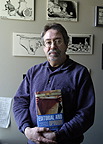March 09, 2007
Author: Fewer newspapers weakens democracy
CARBONDALE, Ill. — Back in 1923, 502 U.S. cities enjoyed the benefits of having at least two local newspapers competing for attention and advertising. The arrangement made for a thriving democracy, in which a plethora of ideas, opinions and agendas struggled for supremacy with the local readers.By 1930, however, the number of communities in that category had dropped by almost half, down to 288. By 2003, such markets existed in only two dozen cities across the country.
A researcher at Southern Illinois University Carbondale in a new book argues that America's democracy, one of its most dearly held values, has suffered as the number of editorial voices competing in communities has fallen during the past 75 years.
"Democracy is losing out," said Steve M. Hallock, author of "Editorial and Opinion: The Dwindling Marketplace of Ideas in Today's News" (Praeger Publishers, 2007). "I buy into (the idea) that when truth and falsehood grapple, truth will prevail, better ideas tend to win. So it's important to have many ideas expressed in the community.
"We still have that on the national level, but at the local level we're losing out."
A 30-year veteran of newsrooms in eight states, Hallock bases his findings on an examination of what many consider the heart of any newspaper: its editorial or opinion pages. Such pages reflect not only what's going on nationally, statewide and locally, but they also reveal what that publication as an institution thinks is important, or its "agenda."
An agenda is revealed by several factors, including how many times a publication addresses a topic, as well as what it says about it. A newspaper's agenda impacts its community and its leaders in subtle and obvious ways by identifying issues and outlining stances by leaders and organizations, including the newspaper itself.
Hallock's book examines the content of editorial opinion pages to analyze how this shrinking marketplace affects the diversity of ideas, agendas and opinions available for public consideration.
An assistant professor in the School of Journalism in SIUC's College of Mass Communication and Media Arts, Hallock became interested in newspaper content analysis while pursuing his doctorate. He later developed a spread sheet-based method for evaluating the content of editorial pages by assigning value codes to certain parameters and analyzing the outcomes.
Hallock examined whether and to what extent corporate ownership of a newspaper affects its editorial voice. Looking at nine competitive newspaper markets, selected for their unique characteristics, he examined editorial pages published in January of 2003, a key time for governments because of budgeting and major addresses such as the State of the Union speech by the president, and during the 2006 presidential election. He looked at factors such as a shift in ideology on the Bush Administration's policies or how the papers framed an issue.
For Hallock to compare framing and ideological differences, it was necessary to examine competing newspaper editorials on the same topics. Many papers, he found, did indeed editorialize on the same issues. But he also found something he did not expect in the small community of Wilkes Barre, Pa.
For some reason, the two papers in that community wrote far more editorials about local issues than did other papers. Not only that, Hallock also found the two papers rarely wrote about the same topics, making for a rich diversity in topics and multiple agendas. This finding prompted Hallock to go back to his data and look for this occurrence in other markets. Sure enough, on second examination he found the same occurrence in the other markets.
"This is what's really wonderful about research, when you find something you don't expect. I found a big difference in agenda-setting, as opposed to ideological differences," Hallock said. "I knew then I had a book, not just a dissertation."
Hallock said the residents of Wilkes Barre and the other communities were well-served by their local papers writing about so many different local topics. Such public discourse kept residents informed, which translated to better candidates, policy and government responsiveness. In short, the competition strengthened democracy, just as the country's founders had envisioned.
"This is how democracy was supposed to work," Hallock said. "We've lost this in the local marketplace and as a result, our democracy is hurt."
The growing number of Internet blogs is having an impact on the number of community voices available to residents, but Hallock said they don't take the place of a newspaper.
"There are good blogs and bad blogs but very few have the resources and the staff to do investigations and do what journalists do in compiling information and providing context," he said. "They're more anecdotal in their reporting and opinions."
Corporate ownership of newspapers tends to cut down on the number of independent voices in communities, Hallock said, even though many such companies often have policies giving local editorial boards power to determine the paper's stance.
"There is a strong correlation between the culture of a company and the newspaper's editorial voice," Hallock said. "Even though these companies say their newspapers are independent, they're the ones who hire the managers and the editors. They put the people in there that think the same way as the company. The whole thing promotes like thinking."
Hallock suggests the industry explore new business models, such as governance by an entity like National Public Radio or other private non-profit groups. Universities that have student newspapers also should more actively encourage their papers to compete with local papers, he said.
"It's not that I think people shouldn't own newspapers and make a profit," said Hallock, who worked as a reporter, sports editor, editorial page editor and editor. "It's just that stockholders aren't interested in stirring things up. They tend to encourage newspapers to do the feel-good, community journalism that we typically see from them.
"We need a way to keep them honest."

